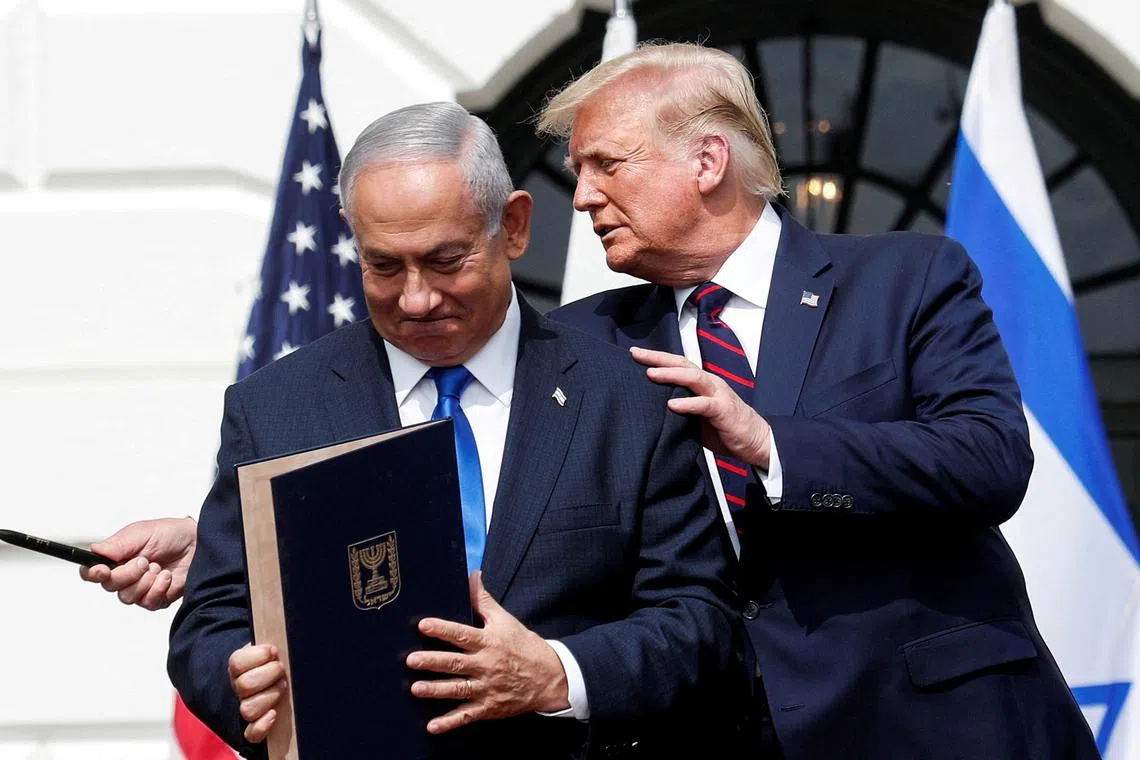Netanyahu leaves for Washington looking to deepen ties with Trump
Sign up now: Get ST's newsletters delivered to your inbox

Israeli Prime Minister Benjamin Netanyahu with US President Donald Trump in Washington in 2020.
PHOTO: REUTERS
Follow topic:
JERUSALEM - Israeli Prime Minister Benjamin Netanyahu left Israel on Feb 2 for a meeting with US President Donald Trump, that he hopes will reset relations with Washington after tensions with the previous administration over the war in Gaza.
Mr Netanyahu, the first foreign leader to visit Mr Trump since his inauguration in January, leaves with a six-week ceasefire in Gaza still holding and negotiations aimed at a second phase expected to begin this week.
“The decisions we made in the war have already changed the face of the Middle East,” he said at the airport before his departure for the meeting, expected on Feb 4.
“Our decisions and the courage of our soldiers have redrawn the map. But I believe that working closely with President Trump, we can redraw it even further and for the better.”
In his previous term, Mr Trump handed Mr Netanyahu a series of successes, including the relocation of the US embassy to Jerusalem and the signing of the Abraham Accords, normalising relations between Israel and a number of Arab states including the United Arab Emirates and Bahrain.
Mr Trump’s new administration includes several pro-Israel figures expected to endorse expansion of Israeli settlements in the occupied West Bank and resist international pressure over the war in Gaza.
The war, which erupted in the wake of the Hamas-led attack on Israel in October 2023
As well as the ceasefire, talks are expected to focus on Saudi Arabia and Iran, which last year launched hundreds of missiles and drones against Israel.
Mr Trump quit an international nuclear deal with Tehran in 2018 and both he and Mr Netanyahu have vowed to stop Iran developing nuclear weapons. Meanwhile, concerns have grown in Iran that the new president might give Mr Netanyahu the go-ahead to hit its nuclear sites.
Both leaders have also pushed to include Saudi Arabia in new regional arrangements building on the Abraham Accords, which Mr Trump has said he expects it to join. Riyadh has also pledged a US investment package that Trump wants to reach $1 trillion (S$1.36 trillion).
For Mr Netanyahu, whose international isolation over the Gaza war was underlined by an arrest warrant from the International Criminal Court (ICC)
Despite former president Joe Biden’s support for Israel during the Gaza war, relations were often strained and Mr Netanyahu has not visited the White House since returning to office at the end of 2022.
Mr Netanyahu is also looking to balance competing pressures from his own coalition.
Israel’s steadfast opposition to any move towards a Palestinian state, which has strengthened in the wake of the war in Gaza, stands as a potential obstacle to a deal with Saudi Arabia
The Gaza ceasefire deal, agreed with the involvement of Mr Trump’s Middle East envoy Steve Witkoff, has also met strong opposition from hardliners who say it ended the fighting before Hamas was finally defeated.
Mr Eldad Shavit, a former intelligence official who worked in the prime minister’s office, said Mr Netanyahu appeared to be balancing pressure from Mr Trump to stick to the ceasefire and domestic opposition to the deal.
“He wants to make sure Trump is on his side, but he also wants to make sure his government doesn’t collapse,” he said. REUTERS

